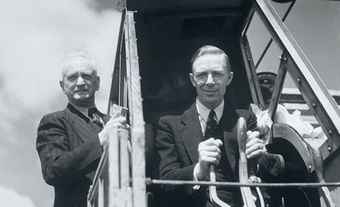
Donald Ross Getty, athlete, businessman, premier of Alberta 1985–92 (born 30 August 1933 in Westmount, QC; died 26 February 2016 in Edmonton, AB).
Football and Business Career
Don Getty graduated in 1955 from the University of Western Ontario with a degree in business administration before joining the Edmonton Eskimos football team, for whom he played quarterback. He was named "Outstanding Canadian" in the Western CFL in 1959.
Getty joined Imperial Oil in 1955 and became a manager at Midwestern Industrial Gas in 1961. In 1964 he formed Baldonnel Oil and Gas and in 1967 became a partner of the investment firm Doherty, Roadhouse and McCuaig.
Early Political Career
Don Getty was among the original six Conservative members elected with Peter Lougheed in 1967 and in 1971 was appointed minister of intergovernmental affairs. He was re-elected in 1975 and reappointed to the Cabinet as minister of energy and natural resources.
Getty left politics in 1979 and became president of D. Getty Investments Ltd. He also served on the boards of several companies, including Brinco, NOVA and the Royal Bank.
Premier
In 1985, Don Getty successfully contested the leadership of the provincial Conservative Party and was sworn in as premier of Alberta on 1 November 1985, winning a seat in a by-election in December. In a worsening economic climate, he saw the Conservative majority reduced from 75 to 61 of 79 seats in the election on 8 May 1986 and faced a difficult stewardship as falling resource prices drastically reduced provincial revenues.
Getty was a strong supporter of the free-trade deal with the United States but its passage had little effect on the province's faltering economy. The provincial election, on 20 March 1989, saw the Conservative strength fall again, to 59 seats, and Getty suffered the embarrassment of losing his own seat. He staged and won a by-election in a more congenial riding. In order to try and reduce spending, Getty introduced wage freezes in the public service. However, massive losses of public money in government-supported companies, such as Novatel, led to further erosion of Getty's popularity. He sought to bolster it with determined support of a "Triple E" Senate and traditional touchstones of Western protest, such as opposition to official bilingualism.
Getty's insistence on Senate Reform led to Canada's first election of a Senator. Getty submitted the name of the election winner, Stanley Waters, as the provincial nominee for the vacant Alberta Senate seat. Prime Minister Brian Mulroney reluctantly appointed Waters to the Senate. Getty continued to push for Senate Reform and was rewarded by the inclusion of an equal Senate in the Charlottetown Accord (see Charlottetown Accord: Document). This was Getty's crowning achievement and he announced his retirement following the signing of the Accord on 9 September 1992 — six weeks before the referendum that rejected the Accord in Alberta and most of Canada.
Getty was succeeded by Ralph Klein as Tory leader and premier of Alberta in December 1992. He was made an Officer of the Order of Canada in 1988.

 Share on Facebook
Share on Facebook Share on X
Share on X Share by Email
Share by Email Share on Google Classroom
Share on Google Classroom

